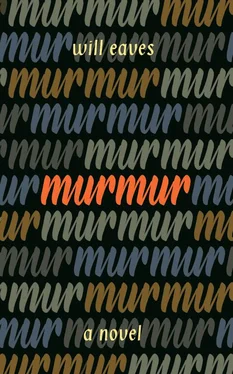Molyneaux smiles, looks pleased to have been caught. More like a friend than heretofore. Flattered, relieved. Hungry.
“I’m going tonight. Across the lake. It’s fifty yards—sixty, no more.”
“And raspberries?”
“All kinds of fruit,” Pryor confirms. “A feast.”
“What if you faint? It’ll be cold.”
“I only faint at blood. That’s perfectly normal.”
“I had to carry you last time.”
Pryor laughs silently, another little wolfish yawn. “I know you did, but this won’t be the same. It’s not footer. As long as you don’t cut yourself sculling. In any case, it’ll be dark. Pitch black. I’d never see you bleed.”
“You are impossible.”
“A thing’s impossible. I am invisible , I think you mean.”
But that is not entirely true. Invisibility, the plane of presence beyond sight, is very rare. What draws the eye, nocturnally, is what we know is there.
Later that night, a full moon sticks in the poplars above the shut boathouse, and by its light a heron stalks beyond the ramp, peers at the onyx lake water. Head feathers lifting from the neck give it the disapproving look of Colonel Stallbrook on the sidelines at a rout.
Pryor jiggles the boathouse lock. He can’t force it. “Nearly, nearly…” Molyneaux hugs himself, heron-like guardian of his friend and yet another failed scheme. “It doesn’t seem to want to go,” Pryor admits, standing. “I’m sorry. Wrong damn pin.”
Despite the chill, Molyneaux grins. They pause to look at each other, the mad assortment of their clothes, pullovers, dressing gowns, and plimsolls for rowing. Pryor dusts off his hands and sheds his outer layers, turns to remove his vest and pants, and walks down to the water’s edge.
And in.
Amazed, Molyneaux stares. The water laps Pryor’s luminous rear. An audible fsss and the naked boy’s white bottom disappears, his arms surrendering. Molyneaux glances round. They haven’t been followed. The heron’s carved out of blue-gray; a little owl calls farther off, perhaps as far away as Deauville, land of greenhouses and raspberry canes. Pryor bobs seal-like in the black expanse.
“Come in!” he whisper-shouts. “We’ll swim.”
Molyneaux balks. He’s neither weak nor shy. He simply has foresight, a sense of what might come to pass. Compared to Pryor, he’s less nervous and less apt to be reckless. He plans—his work is very neat—and that of course is what makes Alec, who is clumsy, his best friend. They are a pair. It’s strange, he often thinks, that Pryor doesn’t seem to have another friend. He could be popular enough. He has a wit. (He liked “one line in Hamlet , and it is the last.”) He’s strong—runs like the wind. Perhaps he simply doesn’t care. He certainly gives everyone the cold shoulder. Noli me tangere . Everyone else, that is.
They swim across the lake that forms a natural boundary to Wargrave School, in search of food. They are the hunter-gatherers of a famished tribe, following a moonlit trail, suspended in a darkened element, wind-ruffled where the oxbow widens and the river terrace drops. Halfway between the boathouse and the other shore, Pryor pulls up, treads water, waits for Molyneaux, who’s making slow progress, breathing poorly, each stroke laboriously conceived.
Pryor prefers to swim beneath the surface of the lake, where he can go faster. He waits and hangs, expelling air so that he sinks, and while he sinks opens his eyes to watch the water’s relic luminosity vanish. Into the dark he falls and feels almost no resistance, his weight distributed. “I’m not falling,” he thinks. “The earth rises.” He has no force. The massive body of the lake bottom—its feet of leaves and grit, the old flood plain, bedrock, downfold, and crust, the whole planet—rushes to greet his cold body.
He has the feeling that he’s staring back in time, or at another part of time. And, as he stares, the white, blown carcass of a moon-like fish—a tench—stares back from the reed bed, its ripped flesh waving in a dense current.
On the far side of Deauville Lake, the Deauvilles, Ceylonese tea giants, built their summer house, and round it in a fertile acre planted an orchard—apples, plums (espaliered), damsons and mirabelles, raspberry canes. It stretches down to shiny pebbles and a gravel bed, in whose unkind embrace the two boys lie, shocked by exposure, both shaking. Molyneaux shakes a little less. His breath comes, when it comes at all, in whistles. He is curled up like a louse. On his blue chest, a salvage team hammers for scrap, battering lungs and heart.
“Alec—”
The other boy makes no reply, but picks his friend up and hauls him through dusty canes toward the summer house—a pavilion with rattan chairs, a daybed, blankets in a pile. The French windows are locked. The waning gibbous moon behind Pryor is bright, and I can see his desperation at the pane—the pane that houses me. He shades his eyes to see inside. The body of Chris Molyneaux has one arm about Pryor’s neck, one foot dragging, the other twisting free.
Panic distracts; it does not concentrate the mind and, while he casts about for stones, Pryor scents warlike omens in the air. A cat, loping along the blue shoreline, stops to observe the scene. A field mouse trails from its mouth. There are others, among the trees. The secret population of the night, avid for death—and Pryor, unwilling to drop his friend, afraid to break the glass. What if he cuts his hand and faints? Who’ll help them then?
Molyneaux’s hanging arm swings once and—points.
A silver hint from underneath a gray stock brick. Pryor lays down the painful weight—Molyneaux twitches, tries to cough—and takes the key and thrusts it in the lock. Something has warped, worked loose; Molyneaux is lying at his feet in the spring mulch, leaves glossy-dark as patent-leather shoes, his body thin and starved but smooth, like some young chief not yet committed to his passage grave, waiting for earth and chalk to wrap him round.
Inside the pavilion, above the daybed, glows a deer’s skull. Pryor shivers. He didn’t see it there before, although it’s bright as Sirius in Canis Major, Procyon, or Capella. And by an optical effect (the angle of the moon), his own reflection peers out from the animal’s long head, which grunts and stares.
The animal he has become inspires him to charge. He butts the door. It falls open, a clatter of springs and uncorked wood. A lightning crack divides my pane and I see everything faulted and thrown.
Pryor lifts Molyneaux, somehow, onto the bed, though Pryor himself is exhausted. Molyneaux’s quiet, his eyes fixed on the goal of survival. Their nakedness a fact, the boys seek warmth, a cave, some rest. The furnishings feel alien and obvious—three blankets with a herringbone pattern, the striped provisional mattress, cushions to make a body comfortable.
When he has put a chair against the door, Pryor climbs into bed and pulls the blankets round them both. Facing the wall and held, Christopher Molyneaux grows no colder. Nothing is said. No more is done. The armor of his chest unfastens in the presence of his friend, whose nervous heat is life.
“I’ll give myself up,” Pryor says, eyes closed, at dawn. “I’ll go back in a minute. To fetch help. Don’t worry, I’ll say it was all my fault.”
The words are whispered into Molyneaux’s white shoulder. Neither body moves. The lake has dried on them.
An hour later, Pryor wakes again and leaves the nest. Molyneaux stays, watching the paint acquire a faint color.
Pryor unhooks the deer’s skull from the wall above his still-curled-up companion. Examines it. Not a good specimen—the back half of the lower jaw’s missing, a gap that, with the open cranial cavity, makes room enough for Pryor’s head.
Читать дальше












